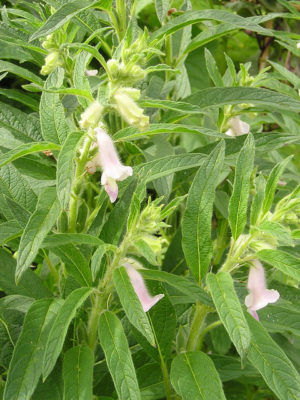
Sesame - Photo by woodleywonderworks
Sesame is one of the oldest oil crops in the world. The small seeds are often seen on the surface of breads, hamburger buns, cakes or cookies.
Names
Scientific
Sesamum indicum
Synonym
Sesamum orientale
English
Sesame
Simsim
Dutch
Sesam
Spanish
Ajonjolí
Sésamo
French
Sésame
German
Sesam
Italian
Sesamo
Taxonomy
Order
Lamiales
Family
Pedaliaceae
Genus
Sesamum
Species
Sesamum indicum (Sesame)
Basic information and facts
Origin:
India
Distribution:
Grown in many tropical countries. Important producers of Sesame are India, Burma, China, Ethiopia, Sudan and Uganda.
Annual, biennial, or perennial:
Annual
Flowers:
The tubular flowers are 3 to 5 cm long and have a four-lobed mouth. Flowers are yellow, white, blue or purple.
Fruits:
Sesame is grown for its edible seeds, which grow in pods. The fruits are 2 to 8 cm long and 0.5 to 2 cm wide. Seeds are small and often have a white color, but the color may vary (e.g. brown, reddish, gray and black.) depending on the variety. Usually the seeds are 3 or 4 millimeters long, about 2 millimeters wide and 1 millimeter thick.
Climate and weather:
Sesame is a tropical crop. It is very drought-tolerant.
Pollination:
?
Height:
Plants are usually between 50 and 100 cm tall.
Spacing:
Propagation:
Propagated by seed.
Insect pests:
?
Diseases:
?
Uses:
Seeds are edible. They are used for example in baking bread (such as hamburger buns), cakes or cookies. Seeds are also used to give taste in various dishes throughout the world.
Sesame seeds are also used to produce oil which is used for cooking in various cuisines.
Proverbs and Quotes
- Pick up a sesame seed only to lose a watermelon.
Did you know that?
- Some people are very allergic to sesame seeds and sesame oil.
Crop categories
Arid crops
Edible seeds
Major crops
Mediterranean crops
Subtropical crops
Tropical crops
Vegetable oils
Pictures

Sesame - Photo by seelensturm

Sesame - Photo by Anna

Sesame - Photo by Anna

Sesame - Photo by Anna
